Welcome to our free classical music site

Do you write about classical music? Are you a blogger? Want to team up with Classical Connect? Send us a message, let's talk!

Do you write about classical music? Are you a blogger? Want to team up with Classical Connect? Send us a message, let's talk!
July 16, 2012. From recent uploads: three pianists. Sofya Melikyan was born in Yerevan, Armenia in 1978. There she started piano studies at the age of five. In 1994 Ms. Melikyan moved to Spain and continued her musical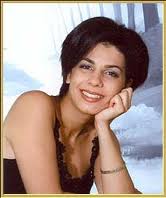 education in the Royal Conservatory of Madrid, as a student of Joaquin Soriano. She graduated in 1999 with the Highest Honor Prize. Subsequently she studied with Galina Egiazarova in Madrid and Brigitte Engerer in Paris (who unfortunately died on June 29th of this year of cancer, at the age of 59). In 2003 she completed the post-graduate program at the Ecole Normale de Musique de Paris and later studied at the Manhattan School of Music with Solomon Mikowsky. Ms. Melikyan has been awarded First Prizes at the Marisa Montiel International Piano Competition in Linares, and the Ibiza International Piano Competition. She has also received top and special prizes at the 15th Jose Iturbi and Maria Canals International Competitions in Spain. An avid chamber musician, Ms. Melikyan is a member of the New York-based Sima Piano Trio, an ensemble that is quickly becoming one of the leading young trios of its generation. Here is Sofya’s performance of Robert Schumann’s Waldszenen (Forest Scenes), Op. 82.
education in the Royal Conservatory of Madrid, as a student of Joaquin Soriano. She graduated in 1999 with the Highest Honor Prize. Subsequently she studied with Galina Egiazarova in Madrid and Brigitte Engerer in Paris (who unfortunately died on June 29th of this year of cancer, at the age of 59). In 2003 she completed the post-graduate program at the Ecole Normale de Musique de Paris and later studied at the Manhattan School of Music with Solomon Mikowsky. Ms. Melikyan has been awarded First Prizes at the Marisa Montiel International Piano Competition in Linares, and the Ibiza International Piano Competition. She has also received top and special prizes at the 15th Jose Iturbi and Maria Canals International Competitions in Spain. An avid chamber musician, Ms. Melikyan is a member of the New York-based Sima Piano Trio, an ensemble that is quickly becoming one of the leading young trios of its generation. Here is Sofya’s performance of Robert Schumann’s Waldszenen (Forest Scenes), Op. 82.
Alexander Osminin is a young Russian pianist. He graduated from the Moscow Conservatory where he was a student in the class of Eliso Virsaladze. He continued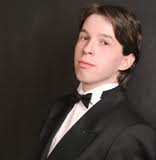 his postgraduate studies with Ms. Virsaladze. Alexander played many recitals in Russia and in Europe. The highlight of his recent tour was the concert in Salle Cortot in Paris. He played several concerts in the Great Hall of the Moscow Conservatory with the New Russia orchestra of Yuri Bashmet, performing concertos by Liszt, Anton Rubinstein, and Ravel. Alexander was successful in several international piano competitions: Concorso Pianistico Europeo "Luciano Gante" (First prize), Sviatoslav Richter International Piano Competition, and several other. Here he is playing Chopin’s Etude Op. 10, No. 5 in G-flat Major, and here – Romance in F-sharp Major, Op. 28, No. 2 by Robert Schumann.
his postgraduate studies with Ms. Virsaladze. Alexander played many recitals in Russia and in Europe. The highlight of his recent tour was the concert in Salle Cortot in Paris. He played several concerts in the Great Hall of the Moscow Conservatory with the New Russia orchestra of Yuri Bashmet, performing concertos by Liszt, Anton Rubinstein, and Ravel. Alexander was successful in several international piano competitions: Concorso Pianistico Europeo "Luciano Gante" (First prize), Sviatoslav Richter International Piano Competition, and several other. Here he is playing Chopin’s Etude Op. 10, No. 5 in G-flat Major, and here – Romance in F-sharp Major, Op. 28, No. 2 by Robert Schumann.
English pianist Sam Armstrong has performed across Europe, Asia and North America as a recitalist, chamber musician and orchestral soloist. He played in the Royal Festival and Wigmore Halls in London, the Concertgebouw Amsterdam and made his New York solo recital debut at Carnegie Hall's Weill Recital Hall in January 2009, as winner of the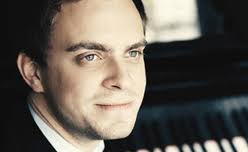 Nadia Reisenberg Recital Award. His performances have been broadcast on BBC Radio, French Television, Radio Suisse-Romande and WQXR New York. Sam has been a top prizewinner in several competitions including the Beethoven Society of Europe Competition in London (2003) and the Porto International Piano Competition in Portugal (2004). Sam recently completed his studies at Mannes College of Music in New York where for four years he was the only student of renowned pianist Richard Goode. Upon graduation he was awarded the Newton Swift Piano Award. He previously studied in Manchester at the Royal Northern College of Music, and he also worked with John O’Conor in Dublin. Here is Sam’s performance of Alban Berg’s Piano sonata op. 1.
Nadia Reisenberg Recital Award. His performances have been broadcast on BBC Radio, French Television, Radio Suisse-Romande and WQXR New York. Sam has been a top prizewinner in several competitions including the Beethoven Society of Europe Competition in London (2003) and the Porto International Piano Competition in Portugal (2004). Sam recently completed his studies at Mannes College of Music in New York where for four years he was the only student of renowned pianist Richard Goode. Upon graduation he was awarded the Newton Swift Piano Award. He previously studied in Manchester at the Royal Northern College of Music, and he also worked with John O’Conor in Dublin. Here is Sam’s performance of Alban Berg’s Piano sonata op. 1.
PermalinkJuly 9, 2012. The Italian composer Ottorino Respighi was born on this day in 1879 in Bologna, Italy. At the end of the 19th century, music in Italy, one of the main European centers two- three hundred years earlier, was pretty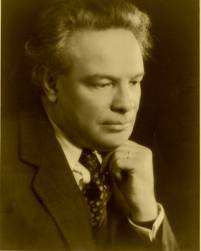 much limited to opera. While it’s true that Rossini, Bellini and Donizetti in the first half of the 19th century, and Verdi’s in its second half brought the art of opera to new heights, orchestral and instrumental music, on the other hand, pretty much languished. Ottorino’s father, a piano teacher, taught him to play piano and violin. Respighi continued his studies at the Liceo Musicale in Bologna, and upon graduating, went to Russia: the Imperial Mariinsky Theater was staging a season of Italian operas, and Respighi was hired as the principal violist in the orchestra. While in Saint Petersburg, he studied compositions with Rimsky-Korsakov. Upon returning to Italy he settled in his hometown, composing and concertizing across Italy, but in 1913 was invited to teach composition at the Academy of Santa Cecilia in Rome. He stayed there for the rest of his life. In 1916 he composed Fontane di Roma, a symphonic poem, which eventually became the first part of the “Roman trilogy,” his most famous set of compositions. The second part, Pini di Roma, was written in 1924, and Feste Romane (Roman festivals) – in 1926.
much limited to opera. While it’s true that Rossini, Bellini and Donizetti in the first half of the 19th century, and Verdi’s in its second half brought the art of opera to new heights, orchestral and instrumental music, on the other hand, pretty much languished. Ottorino’s father, a piano teacher, taught him to play piano and violin. Respighi continued his studies at the Liceo Musicale in Bologna, and upon graduating, went to Russia: the Imperial Mariinsky Theater was staging a season of Italian operas, and Respighi was hired as the principal violist in the orchestra. While in Saint Petersburg, he studied compositions with Rimsky-Korsakov. Upon returning to Italy he settled in his hometown, composing and concertizing across Italy, but in 1913 was invited to teach composition at the Academy of Santa Cecilia in Rome. He stayed there for the rest of his life. In 1916 he composed Fontane di Roma, a symphonic poem, which eventually became the first part of the “Roman trilogy,” his most famous set of compositions. The second part, Pini di Roma, was written in 1924, and Feste Romane (Roman festivals) – in 1926.
The second movement is called "La fontana del Tritone al mattino" (The Triton Fountain in the Morning). The famous fountain, in the center of Piazza Barberini, was created by the great sculptor and architect Gian Lorenzo Bernini in 1642.
The third movement is called "La fontana di Trevi al meriggio" (The Trevi Fountain at noon). Probably the most popular of all Roman fountains, it was completed in 1762, but a fountain has existed on that spot from at least 1453. Even during Roman times water flowed there: it was a terminal point of an aqueduct.
Roman fountains, it was completed in 1762, but a fountain has existed on that spot from at least 1453. Even during Roman times water flowed there: it was a terminal point of an aqueduct.
The last, fourth movement is called "La fontana di Villa Medici al tramonto" (The Villa Medici fountain at sunset). There are many fountains in the gardens of Villa Medici. Most likely Respighi had in mind the one in front of the villa. The villa, which is adjacent to Villa Borgese, sits on top of the Pincio hill. Overlooking the fountain, there’s a wonderful view of Rome, even though it’s now partly obscured by trees.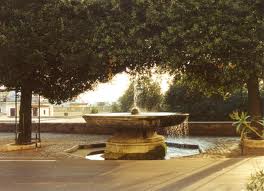
You can listen to Fontane di Roma here. It’s performed by the Pittsburgh Symphony Orchestra, Lorin Maazel conducting (courtesy of YouTube).
PermalinkIn our library, we have a great number of composers wonderfully represented by very talented instrumentalists. With American orchestras, however, the story is very different. Most of them have very strict labor rules and do not allow streaming of their recordings, even those that are not commercial. We have recordings of several of Mahler’s symphonies, and although these can provide the listener with a glimpse of his genius, they don’t present it on the level his music deserves. We’d really like to play some of Mahler’s music during the week marking his birthday, so we turned to YouTube as a source. Here’s Adagio, the fourth movement of the Ninth Symphony. Mahler subtitled is Sehr langsam und noch zurückhaltend – very slow and even reluctant. Leonard Bernstein, who is conducting the Royal Concertgebouw Orchestra, takes these directions quite literally: it’s one of the slowest performances on record and runs almost 30 minutes, about five minutes longer than an average performance of this movement; it’s incredible nine minutes slower than Pierre Boulez’s Grammy-winning account. Some critics think that it’s self-indulgent but others believe it to be one of the best recordings of this heartbreaking work ever made.
The picture of Mahler above was made in 1907, two years before he started working on the Ninth Symphony and three years before his death on May 18, 1910, of incurable heart disease.
PermalinkJune 25, 2012. On Italian Baroque. Recently, while contemplating some pictures of Rome, we were struck, yet again, by the incongruity of terms we use to describe art. This, of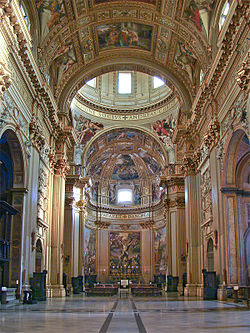 course, is part of a much larger problem, one with which this site struggles often when attempting to "describe" music and performances. The way we try to deal with this issue here is by avoiding it whenever possible: we let our users listen to the music instead of talking about it. Still, the problem remains and manifests itself not only when we attempt the impossible, as in "describing" music, but even in much more mundane areas, such as when we try to classify historical art periods. The term "Baroque" is case in point. The Baroque architecture of Rome has its origins in the late 16th – early 17th century (Carlo Maderno designed Santa Susanna around 1603), and reached its glorious zenith with the works of Francesco Borromini, Pietro Cortona and Gian Lorenzo Bernini in the mid-1600s. When we think "Rome" – the façade of Saint Peter’s, the two iconic churches off Piazza Venezia, Santa Maria di Loreto and Santissimo Nome di Maria al Foro Traiano, the interior of the Gesù, the Trevi fountain – all of it is Baroque. But the music that played in Santa Susanna was not "Baroque" in our understanding of the term. Most likely it was written by composers of the Roman school, like Palestrina and the Spaniard, Tomás Luis de Victoria. Another Roman, Gregorio Allegri, composed his famous Miserere in the1630s (it would not have been sung at Santa Susanna anyway, as it was composed specifically for use in the Sistine Chapel). And as much as we like Palestrina and Victoria, it’s clear that music as art did notdevelop to the heights it had reached in its visual forms till much later, and it didn’t happen in Rome. Lully, and later Rameau and Couperin in France, Purcell in England, and later still Vivaldi, Scarlatti, Bach and Handel brought it to the canonical level which we habitually allot to the great painter and architects of Italy.
course, is part of a much larger problem, one with which this site struggles often when attempting to "describe" music and performances. The way we try to deal with this issue here is by avoiding it whenever possible: we let our users listen to the music instead of talking about it. Still, the problem remains and manifests itself not only when we attempt the impossible, as in "describing" music, but even in much more mundane areas, such as when we try to classify historical art periods. The term "Baroque" is case in point. The Baroque architecture of Rome has its origins in the late 16th – early 17th century (Carlo Maderno designed Santa Susanna around 1603), and reached its glorious zenith with the works of Francesco Borromini, Pietro Cortona and Gian Lorenzo Bernini in the mid-1600s. When we think "Rome" – the façade of Saint Peter’s, the two iconic churches off Piazza Venezia, Santa Maria di Loreto and Santissimo Nome di Maria al Foro Traiano, the interior of the Gesù, the Trevi fountain – all of it is Baroque. But the music that played in Santa Susanna was not "Baroque" in our understanding of the term. Most likely it was written by composers of the Roman school, like Palestrina and the Spaniard, Tomás Luis de Victoria. Another Roman, Gregorio Allegri, composed his famous Miserere in the1630s (it would not have been sung at Santa Susanna anyway, as it was composed specifically for use in the Sistine Chapel). And as much as we like Palestrina and Victoria, it’s clear that music as art did notdevelop to the heights it had reached in its visual forms till much later, and it didn’t happen in Rome. Lully, and later Rameau and Couperin in France, Purcell in England, and later still Vivaldi, Scarlatti, Bach and Handel brought it to the canonical level which we habitually allot to the great painter and architects of Italy.
The church in the picture above is Sant'Andrea della Valle, on what is now Corso Vittorio Emanuele II in Rome. It was designed mainly by Carlo Maderno in 1608 and completed later. Here is an example of the music that could be heard in this church during that time. It’s a motet by Giovanni Pierluigi da Palestrina, Sicut cervus desiderat, (“As the deer thirsts for the waters, so my soul longs for Thee, O God”). It’s performed by the Westminster Cathedral Choir (courtesy of YouTube).
PermalinkJune 24, 2012. Today is the birthday of a dear friend of Classical Connect, Lev Solomonovich Ruzer: he turns 90!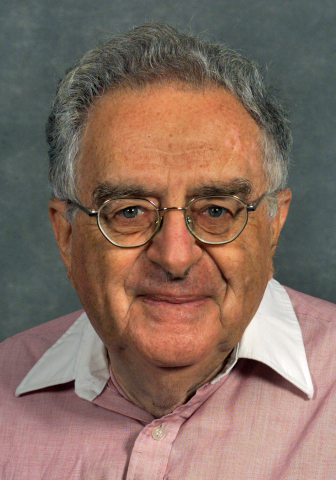 A physicist by profession who successfully transitioned from running a research lab in the Soviet Union to the Lawrence Berkeley National Laboratory, he’s also an amateur pianist. He started piano lessons in his teens,continued playing while at Moscow University, and he still plays piano every day! We suspect that music is what supports his amazing vitality and joie de vivre. On this wonderful day we join his family in wishing him great health, lots of love and more music to enjoy.
A physicist by profession who successfully transitioned from running a research lab in the Soviet Union to the Lawrence Berkeley National Laboratory, he’s also an amateur pianist. He started piano lessons in his teens,continued playing while at Moscow University, and he still plays piano every day! We suspect that music is what supports his amazing vitality and joie de vivre. On this wonderful day we join his family in wishing him great health, lots of love and more music to enjoy.
We could probably record a Classical Connect rendition of Happy Birthday, but we suspect Lev Solomonovich would not be impressed. Here, instead, is the Venezuelan-American pianist Gabriela Montero playing her own improvisation on the traditional tune. She does a much better job with it.
PermalinkJune 18, 2012. Igor Stravinsky. We didn’t have time to talk about Stravinsky last week, but he’s too big a presence in classical music to leave him out completely, so we’ll do it this week instead. Stravinsky was born on June 17, 1882 in Oranienbaum, as small town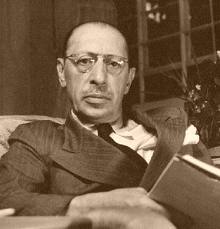 just outside of Saint Petersburg, famous for one the imperial palaces located there. In the past, we’ve written about Stravinsky quite a bit, both about his peregrinations and the radical changes in his compositional style. There’s no doubt that Stravinsky was a musical giant. His compositions, from the early “Russian” ballets The Firebird and The Rite of Spring, to neoclassical composition, such as ballets Pulcinella and Apollon musagète, two symphonies, in C and in Three Movements, and the opera The Rake's Progress, to the latest forays in serialism – practically his complete oeuvre belongs in the pantheon of classical music of the 20th century. But what we thought we’d mention this time, especially in juxtaposition to Richard Strauss, whom we wrote about last week, is the very trite but still somehow surprising fact that geniuses are not always necessarily good. And we don’t mean being “good” in everyday life, although Stravinsky was, apparently, even though entertaining, a rather unpleasant person to be around. We mean their beliefs and political views. It’s well known that Stravinsky was anti-Semitic. That’s not very surprising, considering his aristocratic background and the fact that the Russian aristocracy during the last years of the monarchy was to a large degree anti-Semitic, with wonderful exceptions, of course, such as the Nabokov family. What comes as a shock is Stravinsky’s infatuation with Mussolini. In an interview he gave to the music critic of Rome’s La Tribuna in 1930 he said: “I don't believe that anyone venerates Mussolini more than I… I have an overpowering urge to render homage to your Duce. He is the savior of Italy and – let us hope – Europe.” He also wrote to a German publisher in 1933, “I am surprised to have received no proposals from Germany for next season, since my negative attitude toward communism and Judaism – not to put it in stronger terms – is a matter of common knowledge.” It’s quite ironic that Nazi cultural censors declared Stravinsky a “Jewish modernist” and banned his work from Germany.
just outside of Saint Petersburg, famous for one the imperial palaces located there. In the past, we’ve written about Stravinsky quite a bit, both about his peregrinations and the radical changes in his compositional style. There’s no doubt that Stravinsky was a musical giant. His compositions, from the early “Russian” ballets The Firebird and The Rite of Spring, to neoclassical composition, such as ballets Pulcinella and Apollon musagète, two symphonies, in C and in Three Movements, and the opera The Rake's Progress, to the latest forays in serialism – practically his complete oeuvre belongs in the pantheon of classical music of the 20th century. But what we thought we’d mention this time, especially in juxtaposition to Richard Strauss, whom we wrote about last week, is the very trite but still somehow surprising fact that geniuses are not always necessarily good. And we don’t mean being “good” in everyday life, although Stravinsky was, apparently, even though entertaining, a rather unpleasant person to be around. We mean their beliefs and political views. It’s well known that Stravinsky was anti-Semitic. That’s not very surprising, considering his aristocratic background and the fact that the Russian aristocracy during the last years of the monarchy was to a large degree anti-Semitic, with wonderful exceptions, of course, such as the Nabokov family. What comes as a shock is Stravinsky’s infatuation with Mussolini. In an interview he gave to the music critic of Rome’s La Tribuna in 1930 he said: “I don't believe that anyone venerates Mussolini more than I… I have an overpowering urge to render homage to your Duce. He is the savior of Italy and – let us hope – Europe.” He also wrote to a German publisher in 1933, “I am surprised to have received no proposals from Germany for next season, since my negative attitude toward communism and Judaism – not to put it in stronger terms – is a matter of common knowledge.” It’s quite ironic that Nazi cultural censors declared Stravinsky a “Jewish modernist” and banned his work from Germany.
We probably could go on, but our site is about music, not politics. Here is a wonderful piano arrangement by Guido Agosti of an excerpt from the Firebird Suite. It’s performed by the pianist Daniil Trifonov.
Permalink